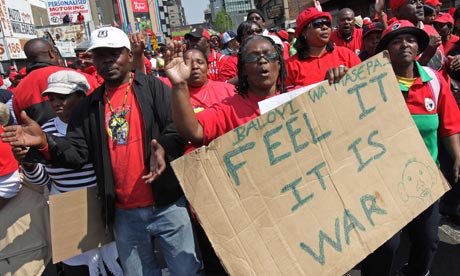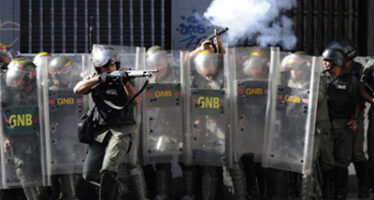South Africa’s unions turn on Jacob Zuma and the ANC
![]()
South Africa’s unions turn on Jacob Zuma and the ANC
A faltering ruling alliance in South Africa is locked in a power struggle as public sector strikes near crisis point
Alex Duval Smith

Deaf, perhaps, and mum, definitely, in response to the cries of his striking populace, President Jacob Zuma led his court and comrades in a solemn reunion at Saint George’s cathedral in Cape Town yesterday for the funeral of anti-apartheid hero Joe Matthews.
Two days earlier, a striking teacher marching in a huge public servants’ demonstration to parliament held aloft a placard suggesting: “Zuma: Give 700 rands 2 your wives.”
Two decades after trade unions played a key role in bringing the African National Congress to power, the £61 monthly housing allowance being offered by the government of the polygamous president to 1.3 million strikers is about as welcome as cake from Marie Antoinette.
And what is really at stake on the 12th day in the most bitter round of industrial action since the end of apartheid is not the 7% pay rise offer or the 8.6% demand – plus 1,000 rands (£88) housing allowance – from the streets. It is the future of the ideologically confused ANC alliance, consisting of the massive Confederation of South African Trade Unions (Cosatu), a Communist party that does not run in elections and an ANC nourished by memories of struggle and comradeship that are increasingly irrelevant to the population.
“The alliance is dysfunctional,” said Cosatu secretary-general Zwelinzima Vavi on Wednesday. “It is unable even to convene an alliance summit for fear of an implosion as a result of fundamental differences on the question of where power lies.”
Last time the alliance reached implosion point, in 2008, the ANC managed to circumscribe the damage, Soviet-style, by ousting the right-leaning Thabo Mbeki and replacing him with the power-hungry Zuma. This time, in the absence of a policy-neutral frontman like Zuma who tells everyone what they want to hear, the entire alliance is threatened, and with it the government of the country. In the run-up to next year’s local government elections, Vavi says the unions will not, as in the past, “give the ANC a blank cheque” by guaranteeing their support.
This week Vavi plans to play his trump card by drawing in the private sector and creating “total shutdown” of the economy. Some 320,000 mineworkers are on standby to down tools on Thursday. The only other meaningful sector in a country with 40% unemployment is the car industry, which is already partially on strike. Some of its 70,000 members marched through the posh Johannesburg suburb of Sandton yesterday.
Vavi’s move is intended to give the heebie-jeebies to the man who really runs South Africa. The de facto prime minister Trevor Manuel, who carries the innocuous title of minister in the presidency in charge of the national planning commission, has maintained the market-friendly course he put in place as finance minister under Mbeki. It brought a World Cup to the country, but it did not change lives. In the past week, when Zuma was in China, Manuel remained in the country but was as quiet as the president.
So worried is Zuma that he has, somewhat clumsily, announced that he will not attend the UN General Assembly at the end of September because it clashes with the ANC national general council policy review conference.
After coming to power against no meaningful national opposition in the April 2009 elections, the ANC under Zuma relied on the firebrand youth league leader, Julius Malema. His role was to pacify the people with rhetoric, including calls for the nationalisation of mines. More interested in immediate delivery, the people did not buy it. Crucially, neither did Cosatu. Amid scandals and calls for new legislation to muzzle the media, Malema increasing looks merely like one of the many “tenderpreneurs”, denounced by Vavi as the ANC’s “predator society”.
The strike is unpopular because public sector workers have a bad image. The police don’t solve crimes. People spend hours queueing up for anti-retroviral drugs outside clinics manned by a skeleton staff of 3,000 military medics. Children sit for their matric (A-levels) in schools where the whims of gangs determine attendance. Social housing is illegally sold to residents by corrupt officials.
But the suffering of the masses is irrelevant to the strike. Amid a lack of political leadership from the president, the ANC alliance’s life expectancy no longer depends on Zuma. It is in the hands of Vavi and will be determined, possibly this week, by his ability to draw the private sector into the strike and make it felt on the world’s stock markets and the share portfolios of South Africa’s middle classes.
Related Articles
USA Pushes Turkey to Join Missile Shield Project
![]()
Top officials from Turkey and the USA met in Brussels on the sidelines of a NATO meeting to discuss the
Los peligros de la militarización en América Latina
![]()
Esther Ceceña La Jiribilla Las lógicas del poder, que se transforman aparencialmente de acuerdo con las situaciones y circunstancias históricas,
¿Qué está pasando en Venezuela?
![]()
Las imágenes de miles de manifestantes en las calles de las principales ciudades venezolanas, el despliegue militar y las



